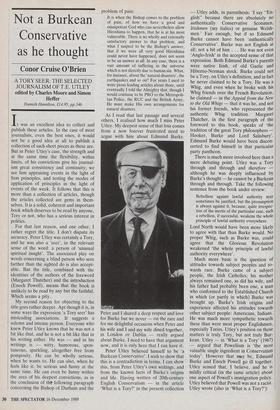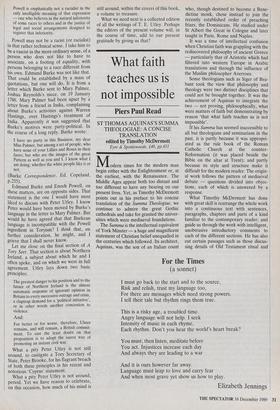Not a Burkean Conservative as he thought
Conor Cruise O'Brien
A TORY SEER: THE SELECTED JOURNALISM OF T.E. UTLEY edited by Charles Moore and Simon Helfer
Hamish Hamilton, £14.95, pp.346
It was an excellent idea to collect and publish these articles. In the case of most journalists, even the best ones, it would not be a good idea at all to ,publish a collection of such short pieces as these are. But in Peter Utley's case, the strength and at the same time the flexibility, within limits, of his convictions give his journal- ism great consistency and continuity; we see him appraising events in the light of firm principles, and testing the modes of application of principles in the light of events of the week. It follows that this is more than a collection of articles, though the articles collected are gems in them- selves. It is a solid, coherent and important book which deserves to be read by anyone, Tory or not, who has a serious interest in politics.
For that last reason, and one other, I rather regret the title. I don't dispute its accuracy. Peter Utley was certainly a Tory, and he was also a 'seer', in the relevant sense of the word: a person of 'unusual spiritual insight'. The associated play on words concerning a blind person who sees farther than the sighted do is also accept- able. But the title, combined with the identities of the authors of the foreword (Margaret Thatcher) and the introduction (Enoch Powell), means that the book is unlikely to be read by any but the faithful. Which seems a pity.
My second reason for objecting to the title goes rather deeper. Apt though it is, in some ways the expression 'a Tory seer' has misleading associations. It suggests a solemn and intense person. Everyone who knew Peter Utley knows that he was not a bit like that, and he is not a bit like that in his writing either. He was — and in his writings is — witty, humorous, spon- taneous, sparkling, altogether free from pomposity. He can be wholly serious, when he wants to. He can also, when he feels like it, be serious and funny at the same time. He can even he funny within the area of his deepest convictions, as in the conclusion of the following paragraph concerning the Bishop of Durham and the problem of pain: It is when the Bishop comes to the problem of pain, of how we have a good and omnipotent God who can nevertheless allow Hiroshima to happen, that he is at his most vulnerable. There is no wholly and rationally satisfactory answer to that problem, and what I suspect to be the Bishop's answer, that if we were all very. good Hiroshima could never have happened, does not seem to be an answer at all. In any case, there is a vast amount of suffering in the universe which is not directly due to human sin. What, for instance, about the 'natural disasters', the earthquakes and so on? For years I used to write pious leading articles about those, until eventually I told the Almighty that, though I would continue to be PRO to the Metropoli- tan Police, the RUC and the British Army, He must make His own arrangements for natural disasters.
As I read that last passage and several others, I realised how much I miss Peter Utley. My deepest sense of that loss comes from a now forever frustrated need to argue with him about Edmund Burke.
Peter and I shared a deep respect and love for Burke but we never — on the rare and for me delightful occasions when Peter and his wife and I and my wife dined together, in London or Dublin — really argued about Burke. I need to have that argument now, and it is only here that I can have it.
Peter. Utley believed himself to be 'a Burkean Conservative'. I wish to show that this is a contradiction in terms. I can show this, from Peter Utley's own writings, and from the known facts of Burke's origins and life. Having written of 20th-century English Conservatism — in the article `What is a Tory?' in the present collection — Utley adds, in parenthesis: 'I say "En- glish" because there are absolutely no authentically Conservative Scotsmen, Irishmen (my italics) or genuine Welsh- men.' Fair enough, but if so Edmund Burke cannot have been 'authentically Conservative'. Burke was not English at all; not a bit of him . . . He was not even 'Anglo-Irish' in the accepted sense of that expression. Both Edmund Burke's parents were native Irish, of old Gaelic and Hiberno-Norman stock. Burke could not be a Tory, on Utley's definition, and in fact he never claimed to be a Tory. He was a Whig, and even when he broke with his Whig friends over the French Revolution, he claimed — in the Appeal from the New to the Old Whigs — that it was he, and not his former friends, who represented the authentic Whig tradition. Margaret Thatcher, in the first paragraph of the foreword to this book, speaks of 'the tradition of the great Tory philosophers Hooker, Burke and Lord Salisbury'. Edmund Burke would have been discon- certed to find himself in that particular party pantheon.
There is much more involved here than a mere debating point. Utley was a Tory through and through and therefore although he was deeply influenced by Burke's thought — he cannot be a Burkean through and through. Take the following sentence from the book under review: Rebellion against lawful authority may sometimes be justified, but the presumption is always against it, because, quite irrespec- tive of the merits of the particular case, such a rebellion, if successful, weakens the whole principle of lawful authority everywhere.
Lord North would have been more likely to agree with that than Burke would. No proper Whig, such as Burke was, could agree that the Glorious Revolution weakened 'the whole principle of lawful authority everywhere'.
Much more basic is the question of attitudes towards subject peoples and to- wards race. Burke came of a subject people, the Irish Catholics; his mother always remained one, as did his wife, and his father had probably been one, a man who conformed to the Established Church in which (or partly in which) Burke was brought up. Burke's Irish origins and experience affected his attitudes towards other subject people: Americans, Indians. He was much more sympathetic towards these than were most proper Englishmen, especially Tories. Utley's position on these matters is truly Tory, but not truly Bur- kean. Utley — in 'What is a Tory' (1967) — argued that Powellism is 'the most valuable single ingredient in Conservatism today'. However that may be, Edmund Burke and Enoch Powell go ill together. Utley sensed that, I believe, and he is mildly critical (in the same article) about one aspect of Powell's immigration policy. Utley believed that Powell was not a racist. Utley wrote (also in 'What is a Tory?'):
Powell is emphatically not a racialist in the only intelligible meaning of that expression — one who believes in the natural inferiority of some races to others and in the justice of legal and social arrangements designed to register that inferiority.
Powell may not be a racist (or racialist) in that rather technical sense. I take him to be a rascist in the more ordinary sense, of a person who does not like to have to associate, on a footing of equality, with persons belonging to a race different from his own. Edmund Burke was not like that. That could be established by a mass of quotations, but one will do. It is from a letter which Burke sent to Mary Palmer, Joshua Reynolds's niece, on 19 January 1786. Mary Palmer had been upset by a letter from a friend in India, complaining about Burke's activities against Warren Hastings, over Hastings's treatment of India. Apparently it was suggested that Burke's motives were party-political. In the course of a long reply, Burke wrote:
I have no party in this Business, my dear Miss Palmer, but among a set of people, who have none of your Lillies and Roses in their faces; but who are the images of the great Pattern as well as you and I. I know what I am doing; whether the white people like it or not.
(Burke Correspondence. Ed. Copeland, P.255). Edmund Burke and Enoch Powell, on these matters, are on opposite sides. That statement is the one I would have most liked to discuss with Peter Utley. I know Peter would have been moved by Burke's language in the letter to Mary Palmer. But would he have agreed that that Burkean language is incompatible with the Powell ingredient in Toryism? I think that, on further consideration, he might, and. I grieve that I shall never know.
Let me close on the final section of A Tory Seer. That section is about Northern Ireland, a subject about which he and I often spoke, and on which we were in full agreement. Utley lays down two basic principles:
The greatest danger to his position and to the future of Northern Ireland is the almost automatic response of ignorant opinion in Britain to every successive outrage and crisis, a claptrap demand for a 'political initiative', or in other words another concession to violence.
And:
For better or for worse, therefore, Ulster remains, and will remain, a British commit- ment. To cast the least doubt on that proposition is to adopt the surest way of promoting an instant civil war.
What a pity Peter Utley is not still around, to castigate a Tory Secretary of State, Peter Brooke, for his flagrant breach of both these principles in his recent and notorious 'Cyprus' statement.
What a pity Peter Utley is not around, period. Yet we have reason to celebrate, on this occasion, how much of his mind is
still around, within the covers of this book, a volume to treasure.
What we need next is a collected edition of all the writings of T. E. Utley. Perhaps the editors of the present volume will, in the course of time, add to our present gratitude by giving us that?



















































 Previous page
Previous page